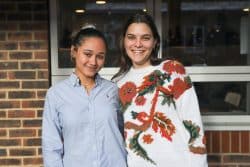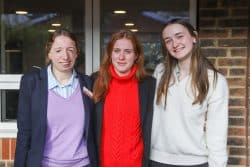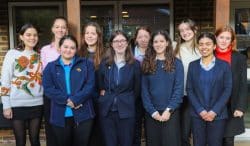100% A*/A Grade EPQs for Burgess Hill Girls
16 Jan 2024
Burgess Hill Girls is celebrating a stunning set of results in the Extended Project Qualification (EPQ) with all students achieving A*/A grades.

All Sixth Form students at Burgess Hill Girls complete an EPQ in Year 12, their first year of Sixth Form. This year’s project titles ranged from “Is morality relative or absolute?” to “Does Fleabag provide an accurate representation of a modern-day feminist?” 100% of students were awarded an A* or A reflecting the continued importance and success of the EPQ at Burgess Hill Girls.
The EPQ is increasingly valued by universities, who offer lower UCAS grade requirements to pupils with excellent EPQs. It is now also being recommended by Oxbridge and medical schools as an enhancement to an A Level portfolio as it prompts intriguing interview discussion. Almost all this year’s cohort at Burgess Hill Girls have already benefitted from their excellent EPQ results with lower grade offers from universities including Exeter, UCL, Warwick and York.
According to Rohaise Flint, Assistant Head Academic at Burgess Hill Girls, there are additional longer-term benefits from undertaking the EPQ:
“In a future defined by an accelerating pace of change in so many areas of human activity, critical thinking and problem-solving skills are essential. The EPQ encourages students to ask and seek answers for the more complex and difficult questions of the world around them.”
Jenny Scopes, EPQ Coordinator at Burgess Hill Girls, added:
“Our students’ intellectual progress develops beyond that of the average sixth former. They learn how to build independent research, manage their time, think critically, and author an analytical essay in an academic style. We find they also relish the opportunity to choose their own topic and study an area of personal interest in depth.”

Anna Contreras, who received an A* for her EPQ titled ” What is the most effective treatment for generalised anxiety disorder?”, valued the insight into academic life.
“I am interested in a career in medical research. As the majority of my sources were written by professors doing exactly this, it gave me an insight into the work that they do and what a career like this would involve.”
Caitlinn Dineen, who received an A for her EPQ titled “Is Taylor Swift a good role model?”, learnt valuable leadership skills.
“I feel much more capable and independent when deciding if I should look up to or admire someone, which will be valuable in the future when developing my own leadership style.”
Maia Tollner, who received an A* for her EPQ titled “Does Fleabag provide an accurate representation of a modern-day feminist?,” expanded her knowledge of feminism.
“I now have a greater understanding of the development of feminist values in our society, up to the present day.”
Emma Hitchens, who received an A* for her EPQ titled “Should prisons in England and Wales aim to punish or to rehabilitate through reforms?,” improved her presentation skills.
“I developed my public speaking skills through the presentation aspect of the EPQ, learning to vary my tone and volume to keep my audience engaged.”

“This project will serve as a reminder of what I am capable of.”